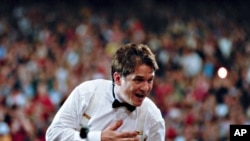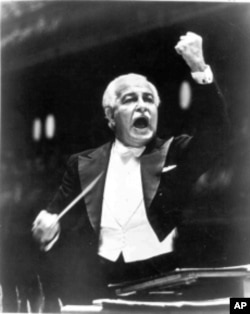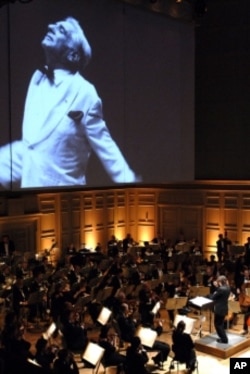This year marks the 125th anniversary of the Boston Pops - the granddaddy of America's popular orchestras.
Since 1897, practically every Boston Pops concert has ended with John Phillip Sousa's immortal march: "Stars and Stripes Forever".
It's part of the repertoire of almost every local orchestra and school band around the country. The Boston Pops and its conductor for 50 years, Arthur Fiedler, had a lot to do with its popularity, according to John Williams, the Hollywood composer who followed in Fiedler's footsteps.
"I think Stars and Stripes goes with the orchestra, goes with the hall and the entire spirit of what the Pops has brought to the American public, principally, but I think because of Fiedler's television and recordings, to a public around the world, as well," Fiedler says.
Accessible orchestra music
But long before Fiedler picked up the baton, the Boston Pops had carved out a niche, bringing light orchestral music to wide audiences.
"As I like to say it, the Pops is the orchestra for people who don't know they like orchestras," says Keith Lockhart, who's been conducting the Boston Pops for the past 16 years. The orchestra was formed in 1885 by some of the Boston Symphony's early benefactors, who were looking to expand the orchestra's appeal by playing popular music. Within a few years, these became known as pops concerts.
"Boston is the first city in the country to have had a public library," says Lockhart. "And, in many ways, I think these very civic-minded people thought, 'How do we make this institution really resonate with lots and lots of people?'"
One way was to make the concerts a festive social occasion. From the beginning, food and drink have been served during Boston Pops performances. In fact, when the city's Symphony Hall was built in 1900, one of its principal features was an elevator in the center of the auditorium, so the seats could be removed and tables put in their place.
The idea, from the beginning, was to make the Boston Pops feel like a different way to experience music.
"You just know that in the slow movement of something that's very poignant and soft, somebody is gonna drop a wine glass," says Lockhart. "But that happens. That's part of the deal."
National icon
Arthur Fiedler was a 35-year-old viola player in the Boston Symphony when he was hired to conduct the Pops in 1930. He soon turned the local phenomenon into a national icon.
Fiedler wanted the Pops to move beyond light European classics and present new American work. He hired a young bandmaster from Harvard, named Leroy Anderson, to do some arrangements for the Pops, then commissioned him to write some new pieces.
"He ended up being the American Johann Strauss, Jr., the ultimate American composer of light, perfectly crafted orchestral music," says Lockhart. "And much of his repertoire, pieces like, oh, Syncopated Clock and Sleigh Ride and things like that we play to this day."
Fiedler used a winning formula for Pops concerts. He started with light orchestral works in the first part, a concerto in the middle, and then let loose at the end, says double bass player Larry Wolfe.
"We let our hair down and rocked as much as we were able and swung as much as we were able," says Wolfe.
Fiedler's son, Peter, says his dad wasn't a snob when it came to programming, embracing rock music by groups like the Beatles.
"The fact that he took, "I Wanna Hold Your Hand," and had that arranged for the Pops was just brilliant," says Peter Fiedler. "I mean it took off like a rocket."
Under Fiedler, the Pops truly became a national orchestra, touring the country and appearing on television. After his death, the baton passed to John Williams, best known for composing Academy-Award winning movie scores. He continued his predecessor's traditions, but brought some Hollywood flair to the podium.
Modern times
"Actually, I was very self-conscious about playing my own music in those concerts and rarely did it, in the '80s."
Bass player Larry Wolfe says it's always a kick to play John Williams' music.
"We're playing this stuff. The man who composed it is conducting us. And, the audience knows it. They sense that same kind of excitement and are just as engaged as we are."
Current conductor Lockhart says one of the most exciting - and well-attended - events of every Boston Pops season comes on the evening of July Fourth.
"The July Fourth concert is an amazing thing. It's more of a sociological phenomenon than it is a musical event, but we are at the center of it. In the course of one concert, we play for a larger live crowd than all but I think two or three orchestras in the entire country play for, over the entire year. This is 500,000 or 600,000 people. It's a huge, huge party."
And the party continues all summer.
The Boston Pops will be giving concerts in and around Boston and at Tanglewood in the Berkshires.















